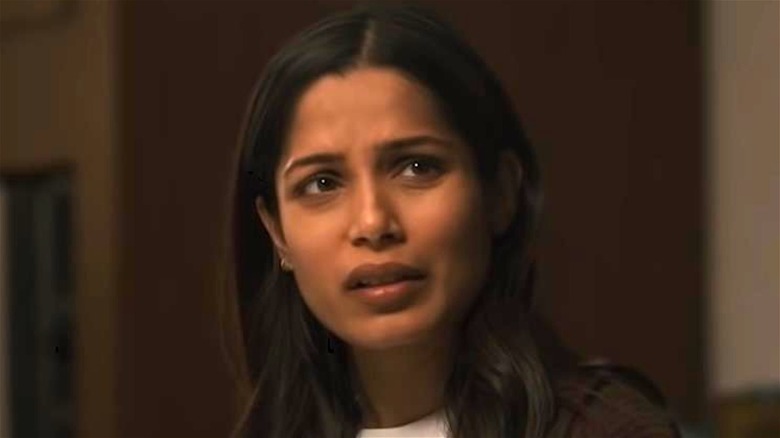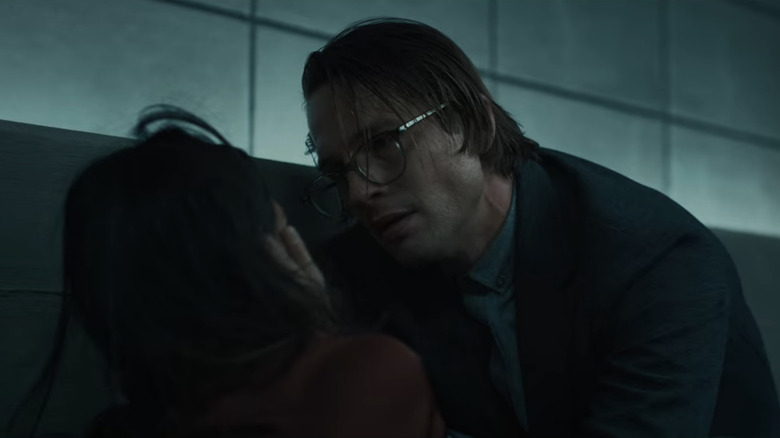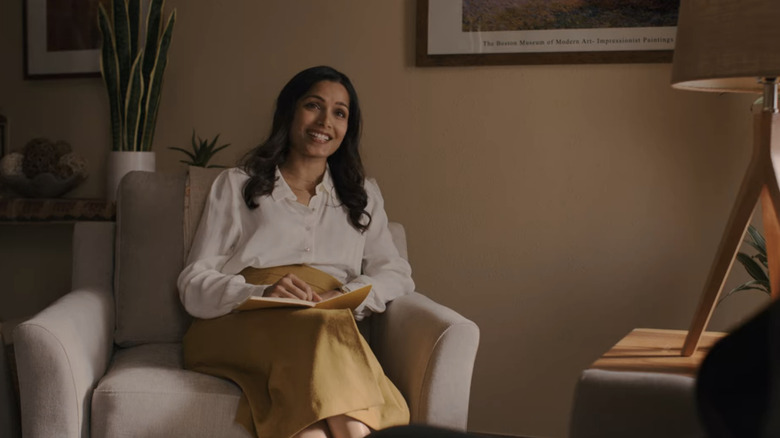The Ending Of Intrusion Explained
While monster movies are horrific in their own way, oftentimes, realistic scenarios inspire the most terrifying movies of all. Enter the home invasion thriller that's currently heating up on Netflix — "Intrusion." The creepy-crawly thriller centers on a married couple named Henry (Logan Marshall-Green) and Meera (Freida Pinto), who move into a beautiful new house. In fact, Henry (who's an architect) designed the house himself and made it their dream space.
But things aren't always what they seem, and the happiness quickly turns sinister after their home is broken into and Henry shoots one of the intruders with a gun that Meera didn't know he had. Left shaken after the break-in and following events, Meera questions Henry's own calm reaction, and things only get worse after the local police department reveals that a missing person's case may have something to do with their home invasions.
"Intrusion" is a fun thriller for fans of the genre, but it's not necessarily getting the best ratings, according to sites like Rotten Tomatoes. Nonetheless, there's a shocking twist by the end, which is always a nice touch for a thriller. Here's the ending of "Intrusion," explained.
Beware, there are some major spoilers beyond this point.
A different kind of sickness
Earlier in the film, Meera realizes that Henry has a connection to the missing college student named Christine Cobb (Megan Elisabeth Kelly). Apparently, Henry worked with Christine's father on the construction of his and Meera's fancy new home, though he never told Meera about this. Meera does confront Henry about it but is assuaged when a different creepy guy seems to be arrested for the Christine Cobb case, and she forgives Henry for lying.
Of course, we later realize Henry lied again, and in reality, he was involved with Christine's disappearance after all. In fact, he creepily built a hidden room into his home office, and when Meera finally finds it and pokes around, she finds Christine tied up to a pipe and blindfolded. Henry then enters the hidden room and explains to Meera that he didn't ask to be born "that way" — aka as a kidnapper and general horrible person — just like Meera didn't ask to be diagnosed with the cancer that she's currently in remission from. Um, what?
Thankfully, Meera doesn't fall for this horrible excuse for an apology, and she instead fights to save herself and Christine.
The Chekhov's Gun moment
Writers sometimes use a dramatic principle called Chekhov's gun to add important details to their stories. According to Masterclass, Chekhov's gun "encourages writers to not make false promises in their narrative by including extemporaneous details that will not ultimately pay off by the last act, chapter, or conclusion." For example, you wouldn't use a whole scene in a movie to introduce an object, say a romantic gift, without it being of significant importance to the plot.
This takes us back to "Intrusion," and its own Chekhov's gun moment. Meera is a therapist, and early on in the film, she mentions to a patient that her husband wooed her with a gift of a clock on their first date and that she still has it to this day. While this tidbit seems unnecessary, it actually provides the basis for one of the most crucial moments in the entire movie.
At the end of the film, when Henry confronts Meera in his hidden room, he loses control and ties Meera up to prevent her from calling the police. Meera eventually breaks free and releases Christine too, and the two attempt to run off when Henry returns to the room. After a stress-inducing chase, Henry gears up to kill Christine but is stopped short when Meera hits him with something hard over the head — the infamous clock trinket.
It turns out it wasn't such a random plot detail after all, and it allowed Meera to put an end to Henry's madness.


